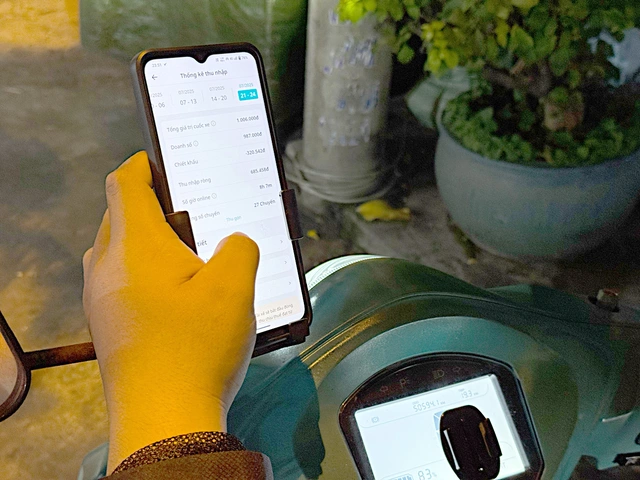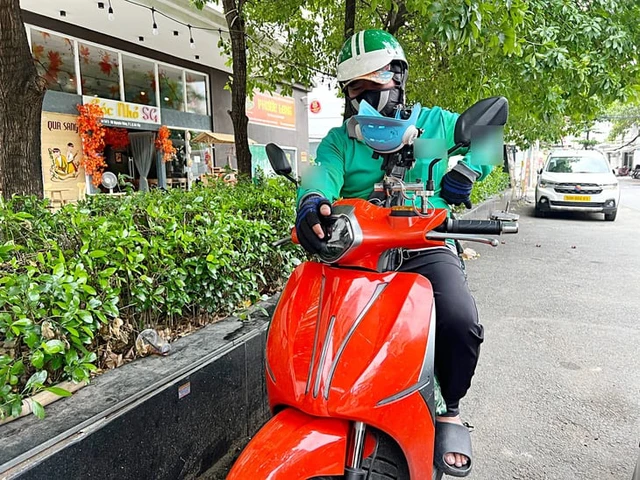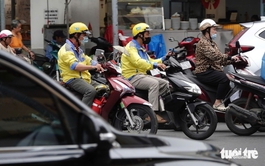
Phuc Duy checks his ride-hailing app on a smartphone during a break in Ho Chi Minh City. Photo: An Vi
Another long day of gig work on his electric motorbike is about to begin.
Among nearly 20 bikes parked in the lot, Nguyen’s vehicle enjoys a special privilege: a spot near the electrical outlet.
Each month, he pays an extra VND400,000 (US$15) to his landlord to charge his bike.
But sometimes, in his rush, he forgets to plug it in at night.
Same hustle, different fuel
With a full battery, Nguyen tosses his 3kg charger into the bike’s compartment and rides off—no engine noise, no emissions, just a quiet hum as the bike glides through the streets of Thu Duc.
Nguyen joined a ride-hailing company focused on electric vehicles seven months ago.
After paying a VND4-million ($152) deposit, he received a free electric bike from the firm.
The company deducts a commission from each ride, but Nguyen says his daily cost is electricity—cheaper, he insists, than gas.
“When I hit 5,000km, I bring it in for a check-up,” Nguyen said.
“If something goes wrong and it's the manufacturer’s fault, repairs are free.
“But if I damage something, I pay out of pocket.”
By midday, after rides through neighborhoods like Linh Xuan and Hiep Binh, his battery dips to 40 percent.
Nguyen uses his app to navigate back toward home, where he knows a quiet café that offers both meals and charging.
“There, I pay VND20,000 [$0.76] to charge,” he said.
“Malls have stations too, but no place to rest, and food’s expensive.”
Over lunch—costing VND30,000 ($1.14)—Nguyen calculates his morning earnings: “VND350,000 [$13.34]. Minus food and charging, I’ve cleared VND280,000 [$10.67]. If I rest a bit and run until 7:00 pm, I can probably pull in VND500,000 [$19] today.”
At the café, other electric bike drivers gather.
One, Phuc Duy, 29, lounges in a hammock.
“Today’s slow. I came back with a 50-percent battery, not even worth charging yet,” Duy joked.
Charging fees are fixed, so many drivers wait until their battery is nearly drained to avoid wasting money.
“Paying VND20,000 to charge when your battery’s still half-full feels like throwing cash away,” Duy said.
Around noon, the café becomes a makeshift barometer of how drivers’ mornings have gone.
A rider who rushes in to snag a charging outlet likely had a busy morning; one who arrives leisurely probably did not land many fares.

Phuc Duy calculates his daily earnings after a day of electric bike rides in Ho Chi Minh City. Photo: An Vi
Both Nguyen and Duy say electric bikes offer similar income to gas bikes—but with caveats.
“You save on fuel, sure. I spend under VND1 million [$38] a month on charging,” Duy explained.
“But gas riders don’t need hours to charge.
“That time could mean VND100,000 [$3.8] or VND200,000 [$7.6] in fares.”
Electric maintenance costs are lower—about VND200,000 every 5,000 km if no issues arise.
“Gas bikes need oil changes, coolant, air filters... they rack up more,” he added.
But electric bikes come with risks.
Rain and flooding can damage the battery, repairs are costly, and charging logistics require constant planning.
“Unlike gas bikes, where you can refuel anytime, we have to think in advance,” said Duy.
“If I pick up a long-distance fare and don’t have enough power, I either cancel or risk running out of battery mid-route.
“A dead battery in a quiet area? That’s a nightmare.
“And you can forget about getting a good customer rating after that.”
A veteran rider goes electric
Some, like Nguyen Duc Hung Huy, 43, made the switch voluntarily—and with no regrets.
In Hanh Thong Ward, Huy rides a sleek electric bike for a traditional ride-hailing app.

Nguyen Duc Hung Huy, 43, sits on his nearly US$2,000 electric motorbike, which requires charging only once a day, in Ho Chi Minh City. Photo: An Vi
He bought the foreign-brand vehicle a year ago for nearly VND50 million ($1,905) after his old gas scooter became unreliable and expensive to maintain.
“Other drivers told me not to buy electric bikes, saying charging wastes time and income’s lower,” he recalled.
“But I wanted to try something new.
“I even went for a high-end model.”
Huy’s investment paid off.
His battery lasts long enough for him to only charge twice a day, even on busy days.
At noon, he still has 60 percent of battery as he eats his packed lunch and rest.
“I can ride straight through to 8:00 pm,” he said.
He has not visited a gas station for a year and uses the bike for family errands when off duty.
"If you buy a good electric bike, it runs just as powerfully as a gas-powered one," said Huy.
"Some passengers even prefer it as it's smooth, quiet, and the seat's more comfortable.
"Now that I've switched, I'm hooked."
But there are downsides: maintenance can only be done at the manufacturer’s center, which can take over a week, disrupting his income.
Rise of charging cafés
The growth of electric motorbikes has spurred a new kind of business: cafés with built-in charging services.
Phan Thi Bich Ngan runs one such spot along Pham Van Dong Boulevard.
Her 24-hour café offers hammocks, food, drinks, and plenty of outlets.
“I charge VND20,000 per session,” she said.
“Drivers come and stay for hours while their bikes power up.”
Setting up was not cheap.
Ngan had to upgrade her electrical system and install a transformer to handle the load.
Security is also a concern.
“We had to hire more staff after thieves started targeting the charging units,” she added.
“Those chargers cost millions of dong to replace. [VND1 million = $38]
“And if anything goes wrong with the electricity—short circuits, charging errors—it’s a big headache.”




Max: 1500 characters
There are no comments yet. Be the first to comment.